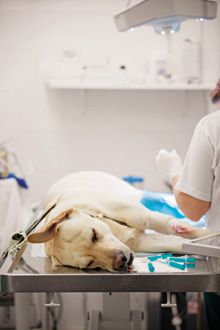Lecture Link: Postanesthesia monitoring pointers for small animals
Life-saving measures indeed since more than 50% of the complications with anesthesia occur while the patient is recovering.

Thinkstock/Getty ImagesIn his presentation "Post anesthesia complications with the small animal patient," at the 2015 CVC in Washington, D.C., Andrew Claude, DVM, DACVAA, discussed some of the most important things to remember in caring for your patients after surgery is complete.
Dr. Claude pointed out that more than 50% of the complications with anesthesia occur while the patient is recovering. He discussed the importance of postoperative monitoring by technicians and key points to be prepared in the event of an emergency.
Monitoring tips
- Postoperative monitoring by a technician is extremely important and should continue until the pet is sternal. Heart rate, respiratory rate, level of sedation, temperature and an assessment of pain should be recorded at regular intervals. It is critical for a technician to stay with brachycephalic dogs.
- Extubation should not be performed until the pet has a gag reflex. If a pet is chewing on the endotracheal tube, a gag reflex is present and extubation should be quickly performed.
- If a pet should begin to obstruct after extubation, intravenous sedation should be administered, and the pet should be reintubated.
- In regards to regurgitation, Dr. Claude thinks that while it may occur during a procedure that requires anesthesia, it is not common during recovery.
- Monitoring pain and dysphoria during recovery is important. Some pets may vocalize and others may seem restless if they are in pain. A technician should monitor this closely and discuss any concerns with a veterinarian. Dr. Claude noted that it is important to remember some pets may vocalize or be upset if they are hungry or have to urinate or defecate.
- Hypothermia can be a serious postoperative complication, so a rectal temperature should be closely monitored. Forced-air products, warm-water pads, rice socks and other methods may be used to keep a pet at an appropriate temperature during the procedure. Socks on the paws of the pets may help prevent heat loss during the postoperative period. Dr. Claude stressed that it is vital to keep pets above 98 F. Although studies do not support this, Dr. Claude does think that warmed fluids can help keep the internal body temperature up.
- As a reminder, Dr. Claude discussed that spring-loaded mouth gags should never be used in cats for there is the concern that blindness may result.
- He also reminded veterinarians that Alaskan malamutes, Siberian huskies and Labrador retrievers may be more sensitive to hydromorphone and can be given a half dose of the medication.